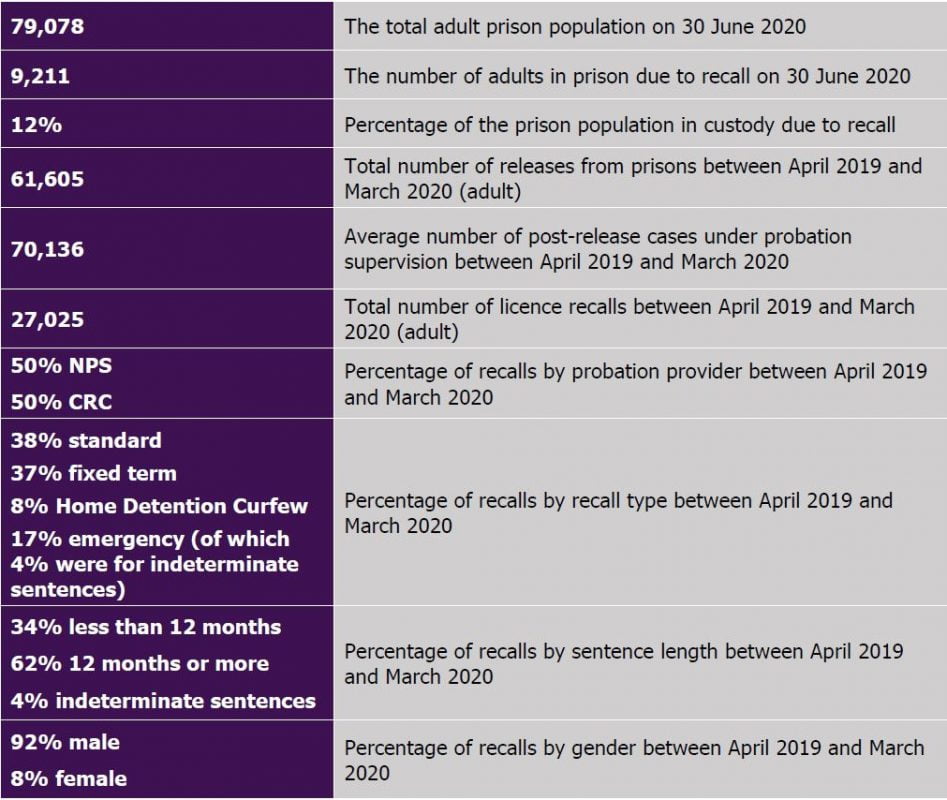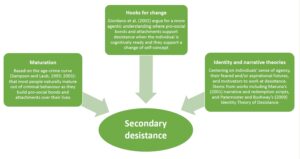Probation recall culture and practice
The Justice Secretary asked HM Chief Inspector of Probation Justin Russell to conduct an independent review into the Joseph McCann case. Mr McCann committed multiple violent and sexual offences in April and May 2019 while under the supervision of the National Probation Service after being released from prison on licence. He was given 33 life sentences in December 2019. At the end of June, HMI Probation published a report which focuses on the circumstances leading up to the offences. Today, the inspectorate has published the second part of the review which looks in more detail at probation recall culture and practice.
Main findings
Recall decisions are often complex and frequently rely on the analysis of detailed information and behaviour. It is important, therefore, that they are supported by a methodical, consistent and fair process. The National Probation Service (NPS) and Community Rehabilitation Companies (CRCs) currently have different processes for recalling individuals, and these are applied inconsistently. It is important that recall decision-making is prioritised and operational staff are given the necessary time and management support to make effective decisions. Probation staff have concerns about the professional and personal consequences if they fail to instigate a recall and a high-profile incident subsequently occurs. A professional culture needs to be at the heart of recall decisions. This requires a consistent process and operational staff having the confidence that they will be supported if they make considered, defensible decisions.
Inspectors found that the current system for licence warnings, which are designed to prevent the need for a recall, varies both between and within organisations and its effectiveness has not been evaluated. Nearly all of the cases reviewed where a warning had been issued still resulted in recall, raising questions about the impact of this approach. Furthermore, license warnings are not subject to additional scrutiny outside of the normal management oversight of cases. This requires urgent attention. It potentially results in inconsistent licence enforcement and is also unfair from the perspective of procedural justice. Alternatives to recall are often used alongside licence warnings, but the effectiveness of this strategy has not been reviewed since it was implemented in 2017. Inspectors were satisfied that when alternatives to recall are considered they are balanced against the requirements of public protection, but there is inconsistency in both their accessibility and use.
Decisions on recall and licence warnings often rely on the judgement of individual practitioners, but these decisions and practice judgements are not routinely monitored for bias and unconscious bias. Disproportional outcomes, particularly for black, Asian and minority ethnic service users, have been identified in other parts of the criminal justice system, but they are not routinely monitored in relation to recall decisions. This needs to be addressed to ensure that recall decisions are routinely scrutinised and any learning can inform improvements in probation practice.
Decisions on recall and licence warnings are complex. Across the nine organisations we inspected, there were examples of responsible officers taking recall decisions to protect victims, potential victims and the public. There were also examples of probation staff coordinating comprehensive support packages for individuals in an attempt to break entrenched patterns of criminal behaviour. This professionalism should be built on with the aim of developing a confident, professional organisational culture.
Recommendations
The probation inspectorate makes a total of eight recommendations, asking HMPPS to:
- introduce a revised process for issuing licence warnings that includes guidance on thresholds, practice advice, and the recording of management decisions
- review the use, accessibility and effectiveness of alternatives to recall. This should include the role of approved premises
- analyse information on recalls to identify any significant variations in practice both between and within organisations. This should include the recall rates for women and black, Asian and minority ethnic service users
- ensure that bias and unconscious bias in recall decisions are reviewed as part of the recall quality assurance process
- review the responsibilities and the actions of the Part B risk assessment process, including the 10-day timescale, to ensure the submitted risk management report is based on all relevant information.
- review the operation of executive release to ensure it operates consistently across all organisations
- ensure there is the necessary time to fully assess the suitability of potential release addresses when implementing home detention curfew arrangements.
- work with CRCs to ensure there is a shared understanding of the recall framework, including thresholds and criteria, within the new English regional probation divisions, when the CRC contracts end.










One Response
Vis-a-vis the NPS, I am aware of [at least] one LDU that issues additional licence conditions like trinkets, with very little by way of managerial oversight outside of that particular office; this waters down their efficacy in the wider system and is, I believe, linked to the phenomenon of unconscious bias mentioned in your report above.